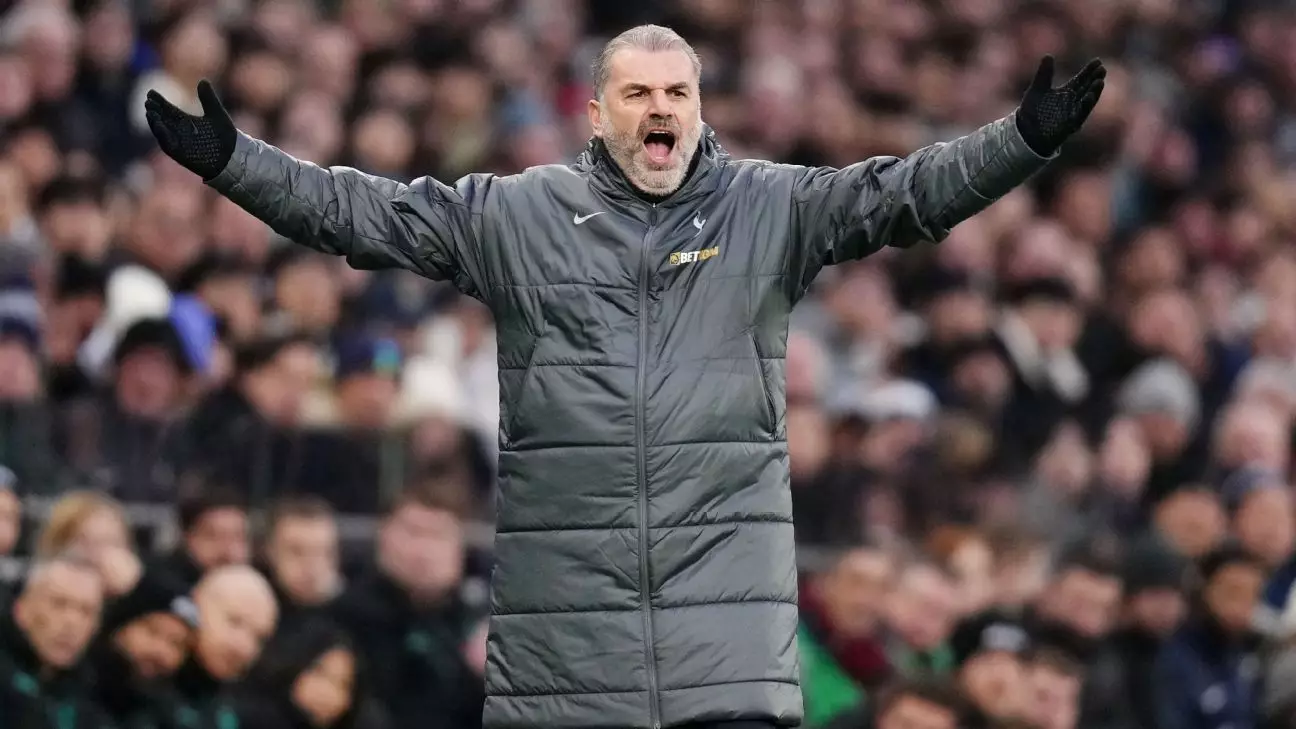Tottenham Hotspur is currently grappling with a significant injury crisis that is testing the resilience and depth of their squad. Following a frustrating 2-2 draw against Wolverhampton Wanderers, manager Ange Postecoglou expressed his concerns regarding player fitness and tactical limitations. The most pressing issue is the unavailability of key players, forcing the manager to rely on less than optimal match fitness from those still standing. The situation not only underscores the fragility of the team but also raises questions about squad management and long-term strategies in the face of adversity.
Relying on Fragile Resources
In Postecoglou’s post-match remarks, he highlighted the necessity of fielding Radu Dragusin despite the defender’s ongoing ankle concerns. With an already depleted squad, Dragusin became the sole available center-back, a position that demands both physicality and strategic acuity. The manager’s candid acknowledgment that “if Radu doesn’t play, I don’t know who plays” signals a crisis of confidence and choice at the club. This limitation not only exposes the team’s lack of depth but also raises critical questions about the club’s capacity to manage injuries effectively.
The injuries to Cristian Romero, Micky van de Ven, and Ben Davies mean that Tottenham is relying heavily on players who may not be completely fit. The risk involved in deploying these individuals could lead to further injuries and an even greater depletion of the squad. While Postecoglou made it clear that Dragusin’s injury is a “judgment call,” the implications of a long-term injury could prove detrimental to an already struggling season.
In addition to Dragusin’s predicament, Tottenham’s injury list includes key players like striker Richarlison and first-choice goalkeeper Guglielmo Vicario, further compounding the manager’s woes. The absence of midfielder Rodrigo Bentancur due to a suspension following his fifth booking adds yet another layer of complications for the upcoming fixtures, particularly with a challenging match against Newcastle United looming on the horizon. Each of these missing pieces disrupts the tactical cohesion that Postecoglou is trying to establish, making it increasingly difficult to rotate players and maintain performance levels.
Furthermore, left-back Destiny Udogie became the latest casualty of the injury crisis, leaving in the 50th minute due to what was suspected to be a hamstring strain. Postecoglou’s concern that the team has been “relying on a core group of players” suggests that, despite their best efforts, fatigue and unanticipated injuries are beginning to take their toll on player performance and selection.
Tottenham’s inconsistent form, with just one win in their last seven Premier League games, has resulted in a disappointing eleven-place standing. This marks a worrying decline, especially considering that the club has not finished a season lower than seventh since the 2008-09 season. What’s particularly alarming is their propensity to concede early, as evidenced in the match against Wolves, where it marked the fifteenth instance this year that they fell behind at home. Such trends indicate a growing crisis not only in player fitness but also in tactical execution. The fact that they managed to take the lead by halftime, thanks to goals from Bentancur and Brennan Johnson, only to allow a late equalizer, highlights a concerning lack of composure under pressure.
In his comments on the draw, Postecoglou noted that the team “looked pretty threatening every time we got forward,” yet failed to deliver crucial moments of clinical finishing and defensive solidity. This inconsistency can be attributed to the reliance on too few players, coupled with the heightened pressure on younger, less experienced team members to step into critical roles at pivotal moments.
The road ahead for Tottenham Hotspur is fraught with challenges and uncertainty. With a core group of players increasingly vulnerable to fatigue and injuries, Postecoglou’s tactical flexibility will be put to the test. The growing pains experienced this season might necessitate a reevaluation of existing strategies, emphasizing the need for deeper squad rotation, better injury management, and potentially even a reassessment of player recruitment strategies.
As the dynamics of the Premier League continue to evolve, the pressure is on Tottenham not just to survive the current season but to emerge more robust for the future. Correcting course will require decisive action both on and off the pitch, to prevent a further decline in fortunes and to restore Spurs to the competitive stature they aspire to maintain.

